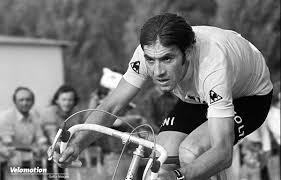In the pantheon of sporting legends, Eddy Merckx stands in a league of his own. Known as “The Cannibal” for his insatiable hunger to win, Merckx didn’t just dominate professional cycling he redefined it. With a relentless drive and unmatched versatility, he elevated the standards of what a cyclist could achieve and left a legacy that still shapes the sport today.
A Star is Born
Born in Belgium in 1945, Edouard Louis Joseph Merckx was raised in a country where cycling was more than a sport it was a way of life. From an early age, it was clear that Merckx had a rare combination of physical talent and mental toughness. He turned professional in 1965, and within just a few years, he would start to change the face of cycling forever.
Total Domination
Between 1965 and 1978, Eddy Merckx amassed a staggering 525 career victories, a record that remains untouched. Among his triumphs were:
- 5 Tour de France victories
- 5 Giro d’Italia titles
- 1 Vuelta a España win
- 3 World Championships
- 7 Milan–San Remo wins
- Countless other classics and one-day races
What made Merckx so extraordinary wasn’t just the quantity of his wins, but the variety. He was equally dominant in grand tours, one-day classics, mountain stages, time trials, and sprints something no cyclist had ever achieved at that level. Most cyclists specialize. Merckx mastered everything.
His performance in the 1969 Tour de France remains legendary: he won the general classification, points classification, mountains classification, and the combination classification all in the same race. That level of all-around dominance had never been seen before and has never been repeated since.
The Cannibal Mentality
Merckx earned his nickname not because he was ruthless toward others, but because he was relentlessly competitive. He never settled for second place not even in minor races. This obsessive drive reshaped professional cycling’s attitude toward winning.
In an era when it was common for top riders to pick and choose events, Merckx raced everything. He believed that every start line deserved his best, regardless of prestige. This approach earned him admiration and fear from competitors, who often felt that they were racing for second place before the race even began.
Pushing the Limits of Endurance
Beyond race wins, Merckx was a symbol of endurance and grit. In 1972, he broke the world hour record, riding 49.431 km in 60 minutes on a standard track bike no aerodynamic helmets or carbon frames, just pure power and pain. His record stood for over a decade and remains one of the most revered feats in cycling history.
He also helped raise the sport’s global profile, taking cycling beyond its European core and into new international markets. His fame transcended sport, making him a cultural figure in Belgium and a household name worldwide.
Legacy of a Giant
After retiring in 1978, Merckx remained deeply involved in the sport as a coach, team manager, bike manufacturer, and ambassador. His name is now synonymous with cycling excellence. The Eddy Merckx Cycles brand continues to produce high-end bicycles, and races like the Eddy Merckx Classic celebrate his unmatched legacy.
More than four decades after his retirement, Merckx is still widely regarded as the greatest cyclist of all time. Riders like Lance Armstrong, Tadej Pogačar, and Chris Froome have all paid homage to his influence. While records can be broken, what Merckx brought to cycling his mentality, versatility, and total dominance remains unmatched.
Eddy Merckx didn’t just win races he devoured them. His aggressive style, refusal to settle, and all-around brilliance redefined professional cycling and set a standard that still looms large over the sport. To this day, every great cyclist is measured against The Cannibal. And none, so far, have quite matched his appetite.

